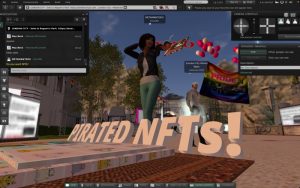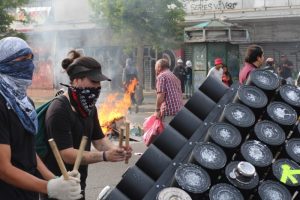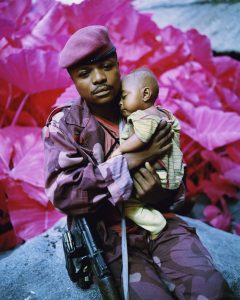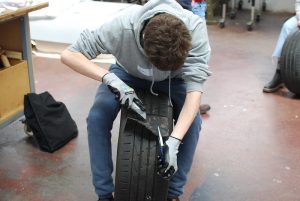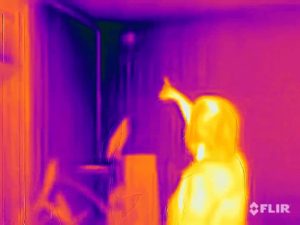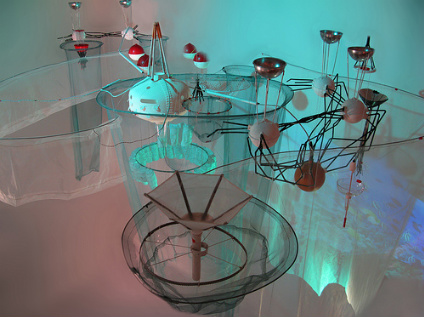
Been slacking a bit with my reports on the work in progress show i saw wow! months ago at the Royal College of Art in London. As you might guess i’ll keep on focusing on the works from the students of the Design Interactions department.
Meet Cesar Harada!
Together with , Hiromi Ozaki, Martin Gautron, Nasser Moustakim, Adrien Lecuru, Valérie Pirson and the help of a whole range of collaborators and experts, Cesar is currently busy developing the Open Sailing project, a floating architecture that evolves like a living organism, a laboratory for techno-social experiments.
The aim of Open Sailing is not to fashion new kinds of entertainment for your holidays but to propose a way to cope with impending natural and man-made disaster, while stimulating people’s ingenuity, fostering hyper-connectivity and sense of solidarity. To make the project all the more relevant, a map has been compiled that visualizes areas of looming crisis: overpopulation, tsunami risk, violent conflict, nuclear fallout, pandemics, global warming, etc. No place on Earth appears to be safe. Except maybe a few large spots above the ocean. And that’s the area where Open_Sailing villagers would drift and live. Each village unit is made of comfortable shelters surrounded by ocean farming modules : reconfigurable, sustainable, pluggable, organic and instinctive. The Open_Sailing_01 is about 50 m in diameter, for 6 persons.
Open_Sailing aims to ask questions about the way we currently inhabit our planet. Can we reach a harmonious dynamic state of interdependence with each other and the earth? Is this the next step for civilization? Will we disassociate our concept of progress with rigid infrastructure and metropolis?
The prototype Open_Sailing_01, currently under construction, will set sail in May 2009, attempting to drift from London to the Netherlands. If the first journey goes well, Open_Sailing_02 will embark on a trip around the Mediterranean with enhanced fleet operating and hardware system, then Open_Sailing_03 will head to the Azores Islands (Portugal). Finally Open_Sailing_04 will set sail from The Azores and drift to Brazil.
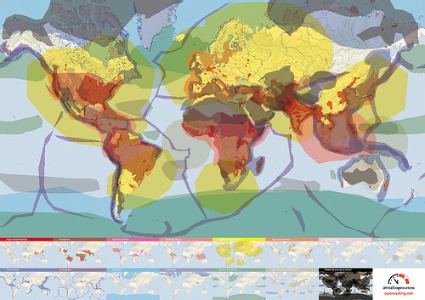 OpenSailing.net & 2012hopes.com concept and world map
OpenSailing.net & 2012hopes.com concept and world map
I was fascinated by the mix of Archigram-esque vision, the gutsy ambition behind the idea, the sheer beauty of the installation at the London show, and that hint of micronation ambition i thought i could smell (but how wrong i was!) around the project. So, as usual, i had to ask a few questions…
Why 2012? Does it have to come so soon? Do you want to spoil the London Olympics euphoria?
Ollie: We’re not particularly in the market for disrupting athletics events!
The project started with research into fear being used as a driving force of mind control. Unfortunately fear is often used as a way of controlling peoples’ actions and justifying things that would otherwise seem irrational. Through this research, Cesar found that a lot of people are predicting bad things for 2012, ranging from the semi-logical to the outright wacky. It’s the end of the Mayan Long Count Calendar, for example, which some New Age figures have heralded as a sort of spiritual renewal, people talk about the galactic alignment and the apocalypse…
Instead of seeing this doom and gloom as something negative, we have taken the fears and used them as design constraints, designing for the apocalypse. By compiling a list of the fears surrounding 2012, and overlaying these onto a series of maps, we have created a series of safe_zones where you can be assured to be free of pandemics, earthquakes, tsunamis, pole shifts, nuclear disasters, violent conflicts, etc. The recurrent safest places are in the middle of oceans : open_sailing aims to make the ability to live there comfortably a reality.
Cesar: I hope the open_sailing is going to continue long after 2012, and actually by 2012 we may have a series of serious prototypes ready for a real sport challenge, steading an ocean for good for example!
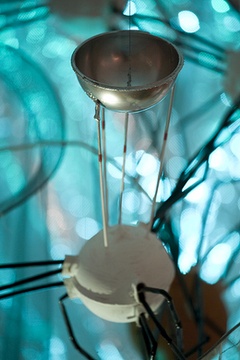 Detail of solar oven
Detail of solar oven
Is it a project you plan to pursue as your final project at RCA? Can we expect to see a more advanced version of it come June?
Cesar: This is just the beginning of the project. The bigger picture is to develop technologies and everyday life solutions for a future International Ocean Station. We have an International Space Station, we need an International Ocean Station, there is so much to discover about the blue planet! At the 25th of June 2009 at the Royal College of Art SHOW in London, we want to show prototypes of the tested shelter, energetic modules, aquaculture facilities etc. We are working on the design of the prototype at the center for the study and practice of survival technics in Lorient France. In April we are building it, in May we will depart from London river Thames and attempt to drift across the north sea escorted by a regular boat for safety. Follow us on the blog. We are still looking for scientists, partners, sponsors, funders : please contact anyone you think could be interested by this project.
I suspect that your project might have given way to feedbacks, questions and reflections during the work in progress show/ How did people react to your project so far?
Abigail: One big difficulty we’ve had so far is creating an explanation of what the project’s about, simply because there are so many different parts to it. There are a lot of people working on this project, a lot of new ideas. Some people seem to have misinterpreted Open_Sailing as being some kind of crazy ‘Apocalypse Boat,’ but it’s not like that at all. This is a very real, very exciting project where we’re developing a lot of innovative technology. Non-sustainable living; overpopulation; global warming… The way we’ve been doing life so far could do with a rethink, don’t you agree?
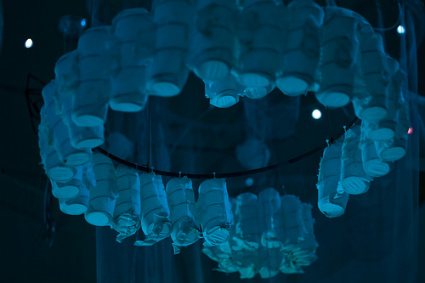 Sea shell harvesting pods
Sea shell harvesting pods
Cesar: Most people are very excited by the idea to live on the sea, most of them think it is impossible. The people who started to dig and understand a little bit more about our project were fascinated, there are so many different perspectives! The Open_Sailing is a floating laboratory in the first place, we are attempting to address many issues in “labs”:
– open_farming : a new way of doing aquaculture and fishing, creating nomadic open ecosystem toward a full nutritive autonomy at sea and more
– swarm_search_engine : an artificial swarm algorythm that runs on geoRSS mashup maps, suggesting safe_zones and structural organization
– energy_animal : an ideal energy module that combines solar, wind and wave power to provide renewable energy in any kind of weather
– life_cable : a connection norm, and API that enable living modules to exchange electricity, water, air, data in one single cable.
instinctive_architecture : which is a new family of ship design that adapts to the most extreme weather conditions by changing shape and texture.
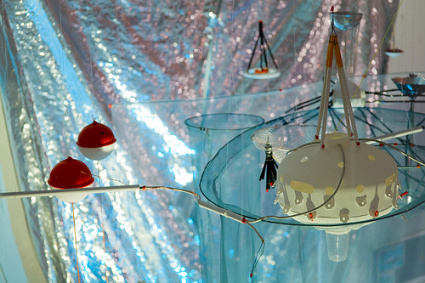 Shelter Buoys
Shelter Buoys
Abigail: Instinctive_architecture behaves a bit like a sunflower. It opens out when there’s lots of light and nutrients, and closes in on itself when weather is bad, stretches to move quickly.
Cesar: There is a lot to do, we address many real problems and people are interested because we are developing all these hardware and software technologies open-source.
Can you describe and explain the vessel prototype you were showing at the RCA work in progress exhibition a few weeks ago?
Cesar: What we showed was a 1/20 model, one open_sailing “family” facility, for 4 to 6 people. From afar, it looks like a “floating bunker” surrounded by a large ocean farm (~50m diameter), lines of algae, inflatable fish nets, plankton basins, floating gardens, underwater sea-shells pods, energy_animals…
Imagine the open_sailing in the ocean, it will be covered with fouling, algae and all sorts of parasites everywhere, shrimps, hundreds of fishes swimming around it, birds in the sky attracted by the fertile drifting structure. Maybe I should describe the instinctive_architecture : when the weather is nice, the open_sailing is spread over maximizing the farming surface, that’s what we showed as a model. When the weather is bad or a danger approaches, all the modules amalgamate and compact to resist. When the open_sailing is moving pulled by a traction point, it becomes long and thin. In many many ways the open_sailing behaves like a living organism, or an adhoc mesh network. The labs I presented before are the first, we will host many more researches on site if it works well.
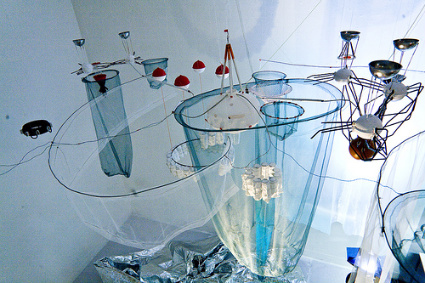 View of Open Sailing from 1st floor at RCA
View of Open Sailing from 1st floor at RCA
I know you’d rather shun the reference to art but have you heard about the floating cities of Tomas Saraceno?
Cesar: I don’t shun the work of Tomas Saraceno at all, I think it is beautiful and visionary. We are sharing a very similar perspective about the transformation of the society with technology.
We are trying to make the open_sailing exist as soon as possible, so we’d rather show shorter term objectives and use a simpler vocabulary to appeal both general public and partners. Please find more details in the pdf on our website.
Have you thought about the status of Open Sailing villages, would they have some sort of sovereign independence similar to one of the micronations?
Abigail: That’s a really interesting question. In short, we’re not interested in establishing any sort of sovereignty. We don’t have a political agenda.
Cesar: We are trying to avoid problems. Sovereignty is a problem, as it implies that you’re being recognised by other states, we are people, we are not a competitive group, our perspective is more practical. Maybe our status is closer to the one of the International Space Station…
Ollie: We’re a floating socio-technological experiment. We’re part of many disciplines (art, architecture, science, etc) but not really bound by any. We’re an international team, and we don’t feel allegiance to any country or political stance – at least within the framework of this project.
Cesar: When you develop a technology, you can’t predict how people will use and modify it. We don’t want to determine how Open_Sailing is used by other people, that’s the openness of it, or a form of respect, an invitation. There must be something more advanced than “nation”. Nation is constitution, hierarchy, pride, it is slow, inefficient – we don’t have the time to be a nation!
Hiromi: We have a sort of operating system, the “swarm search engine”, it is an object oriented politic computer program, managing in real-time weather, available resources (food, water, energy etc.), people’s desires and fears (threats, attractors), moving the fleet into its optimum geographical positions and proposes a general arrangement of the structure.
Ollie: A country by definition has an intrinsic value – in the form of minerals, farming space, infrastructure, buildings, etc. Open_Sailing doesn’t. Open_Sailing is more like an organism. The whole thing is alive – it moves, it reacts to its environment, it evolves, it grows. The people onboard are its source of energy – if you take the people away, it would be like starving an animal of food. In this way we’re different to a country, we are neutral and don’t want to become involved with unnecessary legal issues… for now. Thanks a lot for your time Cesar, Ollie, Hiromi and Abigail!
All images Cesar Harada.

